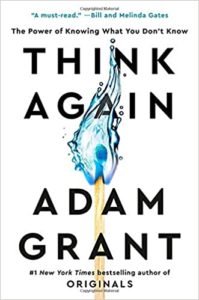By Rose O. Sherman, EdD, RN, NEA-BC, FAAN
The experience with COVID-19 has forced nurse leaders to rethink some of their core beliefs about nursing, health systems, and health policy. We can all become better at reflecting on our world view, our instincts, and assumptions on a more regular basis. This is the new book’s premise, Think Again: The Power of Knowing What You Don’t Know, by Adam Grant, a University of Pennsylvania organizational psychologist. Grant investigates rethinking in three areas—the individual, changing others’ minds, and collective environments. He points out that most of us refresh our wardrobes every year, renovate our kitchens every decade, but never update our beliefs and our views. Our ways of thinking can easily become habits that we don’t bother to question. We fail to update the ideas we formed in the past for the challenges we face in the present.
Grant points out the value of doubt and how we can better embrace the unknown and gracefully accept when we are wrong. Some key insights in the book that nurse leaders can use include the following:
- In a turbulent world, the ability to rethink and unlearn our past beliefs may be more important than our ability to think and learn.
- We favor the comfort of conviction over the discomfort of doubt.
- The smarter you are – the more problem you may have in updating your beliefs.
- Once we accept information as accurate – we rarely bother to revisit it (he sights many common beliefs that are wrong as examples). Things don’t become true just because you believe them.
- Under acute stress – people revert to their automatic, well-learned responses. As we sit with beliefs, they become more not less entrenched.
- Most of us defend our beliefs using one of three modes – the preacher (who supports sacred beliefs even in the face of new information), the prosecutor (who focuses on attacking new ideas), or the politician (whose views are swayed by what others think). Instead, we need to think more like scientists who test their assumptions, run experiments and always leave room for the possibility that they are wrong (null hypothesis).
- Learning should be about evolving our beliefs, not affirming them.
- The world’s best scientists have “cognitive flexibility” or a willingness to move occasionally from one extreme to another.
- Rethinking starts with “intellectual humility” or being willing to acknowledge what you don’t know.
- The most compelling visions for change include the continuity of ideas or bridging the old with the new.
- All of us have “totalitarian egos,” whose job it is to keep out threatening information. Most people have a binary bias – linking complex continuums of beliefs into two extremes.
- When core beliefs are challenged, it can evoke a fight or flight mechanism.
- The best scientists don’t allow their core beliefs to become part of their identity. Values, not beliefs, should be your core principles.
- It is easier to walk away from core beliefs when your life changes direction.
- Admitting you are wrong does not make you look less competent.
- You are entitled to hold opinions in your head but if you express them – ground them in fact and logic.
- When your opinions become your identity, any assault on your worldview is a threat to your sense of self.
- Avoid making conflict relational – but rather keep the conflict focused on the task and how it is done – fight for ideas and not against people.
- Don’t be a “logic bully” who tries to change minds by overwhelming people with facts – it does not work.
- Listening is a key skill in negotiation and a willingness to point out your opponents’ useful observations.
- Always start with the common ground and focus on the process of how the conversation will be conducted.
- Only you can change your own mind, but it is worth asking – what evidence would change your mind?
- Status and belonging are so important that tribal beliefs are powerful, as are stereotypes.
- Asking people to talk about how they have formed their beliefs can be a beginning step to change.
- Refuting a point of view can produce antibodies in the individual against future influence attempts. People become more certain rather than less certain.
- Motivational interviewing techniques are an evidence-based approach to change thinking and behavior.
- Giving more than one choice is always important in influencing the behavior of another.
- Acknowledging complexity is powerful to rethinking and staying curious. Become more nuanced in your thinking and avoid being in “idea cults.”
- Include more caveats in your decisions. Ask the question – how do you know that? – more often.
- Avoid the “escalation of commitment” or adherence to a plan that is not working by rethinking it.
In the end, learning to rethink is a skill set that can lead to more effective leadership in an ever-changing world. It is not always easy to do but learnable.
© emergingrnleader.com 2021
Launch 2021 by giving your leadership team the gift of a highly rated webinar – Nursing Leadership in 2021: Rebooting after a Life-Quake A Nursing Leadership Reboot Workshop
Read the Nurse Leader Coach – Available at Amazon and Other Book Sellers.
Coming Soon a New Book to Strengthen Your Leadership in 2021 – The Nuts and Bolts of Nursing Leadership: Your Toolkit for Success




 LinkedIn
LinkedIn Instagram
Instagram